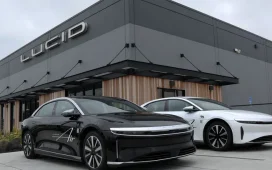BEKASI, Indonesia — By any stretch of the imagination, vehicle assembler Handal Indonesia Motor is not a major player in the domestic auto market. Its one plant, in Bakasi just outside Jakarta, has an annual capacity of 14,000 units, just 1.6% of national sales last year.
But it has grand ambitions. And these are an indicator of how Chinese automakers’ nascent but aggressive expansion in Southeast Asia’s largest economy is threatening to disrupt not just the dominance of Japanese automakers, but their local partners, too.









